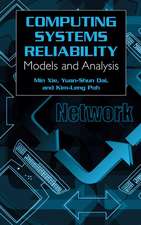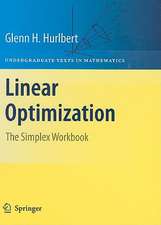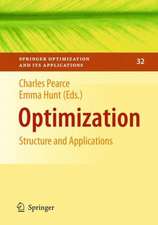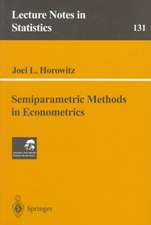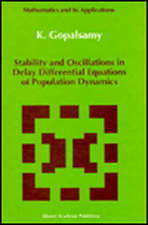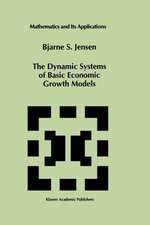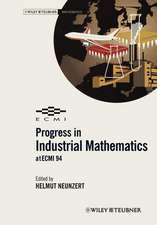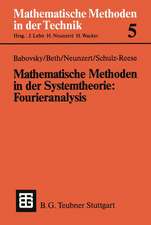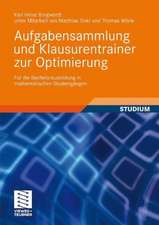Currents in Industrial Mathematics: From Concepts to Research to Education
Editat de Helmut Neunzert, Dieter Prätzel-Wolters Traducere de William Uberen Limba Engleză Hardback – 23 oct 2015
| Toate formatele și edițiile | Preț | Express |
|---|---|---|
| Paperback (1) | 537.97 lei 6-8 săpt. | |
| Springer Berlin, Heidelberg – 23 aug 2016 | 537.97 lei 6-8 săpt. | |
| Hardback (1) | 619.65 lei 38-44 zile | |
| Springer Berlin, Heidelberg – 23 oct 2015 | 619.65 lei 38-44 zile |
Preț: 619.65 lei
Preț vechi: 804.74 lei
-23% Nou
Puncte Express: 929
Preț estimativ în valută:
118.57€ • 129.20$ • 99.91£
118.57€ • 129.20$ • 99.91£
Carte tipărită la comandă
Livrare economică 19-25 aprilie
Preluare comenzi: 021 569.72.76
Specificații
ISBN-13: 9783662482575
ISBN-10: 3662482576
Pagini: 464
Ilustrații: VIII, 437 p.
Dimensiuni: 168 x 240 x 25 mm
Greutate: 1.15 kg
Ediția:1st ed. 2015
Editura: Springer Berlin, Heidelberg
Colecția Springer
Locul publicării:Berlin, Heidelberg, Germany
ISBN-10: 3662482576
Pagini: 464
Ilustrații: VIII, 437 p.
Dimensiuni: 168 x 240 x 25 mm
Greutate: 1.15 kg
Ediția:1st ed. 2015
Editura: Springer Berlin, Heidelberg
Colecția Springer
Locul publicării:Berlin, Heidelberg, Germany
Public țintă
Upper undergraduateCuprins
Foreword.- Introduction.- Modeling.- Numerics.- Data Analysis.- Optimization processes in practice.- Virtual Production of Filaments and Fleeces.- Modeling and Simulation of Filtration Processes.- Maximal Material Yield in Gemstone Cutting.- Robust State Estimation of Complex Systems.- Option Pricing in Practice – Heston’s Stochastic Volatility Model.- Applied School Mathematics – Made in Kaiserslautern.
Notă biografică
Prof. Dr. Helmut Neunzert, Fraunhofer ITWM, Kaiserslautern
Prof. Dr. Dieter Prätzel-Wolters, Fraunhofer ITWM, Kaiserslautern
Prof. Dr. Dieter Prätzel-Wolters, Fraunhofer ITWM, Kaiserslautern
Textul de pe ultima copertă
Mathematics has many branches: there are the pure, the applied, and the applicable; the theoretical and the practical. There is mathematics for school, for college, and for industry. All these belong to the same family and are bound together by a "mathematical way of thinking."
Some mathematicians devote themselves entirely to the well being of this family by preserving it, developing it, and teaching it to the next generation. Others use the familial attributes to help outsiders by taking up their problems and transforming them into mathematical questions in order to solve them. The work of these mathematicians is thus problem driven, based on mathematical models, and oriented on the goal of offering practicable solutions.
This second group is sizeable; its members include almost all college graduates working in industry, in the private sector, or in the Fraunhofer Institutes, for example. This group is hardly visible, however, and one seldom hears its voices either.This book remedies this situation by relating how the scientists of the first Fraunhofer Institute for Mathematics, the ITWM in Kaiserslautern, go about their daily work. In so doing, it illustrates how extraordinarily successful today's mathematics is in helping solve industrial problems and reveals what lies behind this success. Finally, it describes how this exciting field of problem-driven mathematics can be integrated into classroom instruction, thus helping to bring it the recognition it
so richly deserves.
Some mathematicians devote themselves entirely to the well being of this family by preserving it, developing it, and teaching it to the next generation. Others use the familial attributes to help outsiders by taking up their problems and transforming them into mathematical questions in order to solve them. The work of these mathematicians is thus problem driven, based on mathematical models, and oriented on the goal of offering practicable solutions.
This second group is sizeable; its members include almost all college graduates working in industry, in the private sector, or in the Fraunhofer Institutes, for example. This group is hardly visible, however, and one seldom hears its voices either.This book remedies this situation by relating how the scientists of the first Fraunhofer Institute for Mathematics, the ITWM in Kaiserslautern, go about their daily work. In so doing, it illustrates how extraordinarily successful today's mathematics is in helping solve industrial problems and reveals what lies behind this success. Finally, it describes how this exciting field of problem-driven mathematics can be integrated into classroom instruction, thus helping to bring it the recognition it
so richly deserves.
Caracteristici
Shows how problems in the industry can be modelled and solved mathematically Gives examples of applications, research, and education in industrial mathematics Grants a deep insight into the work of the Fraunhofer Institute (ITWM) Includes supplementary material: sn.pub/extras

